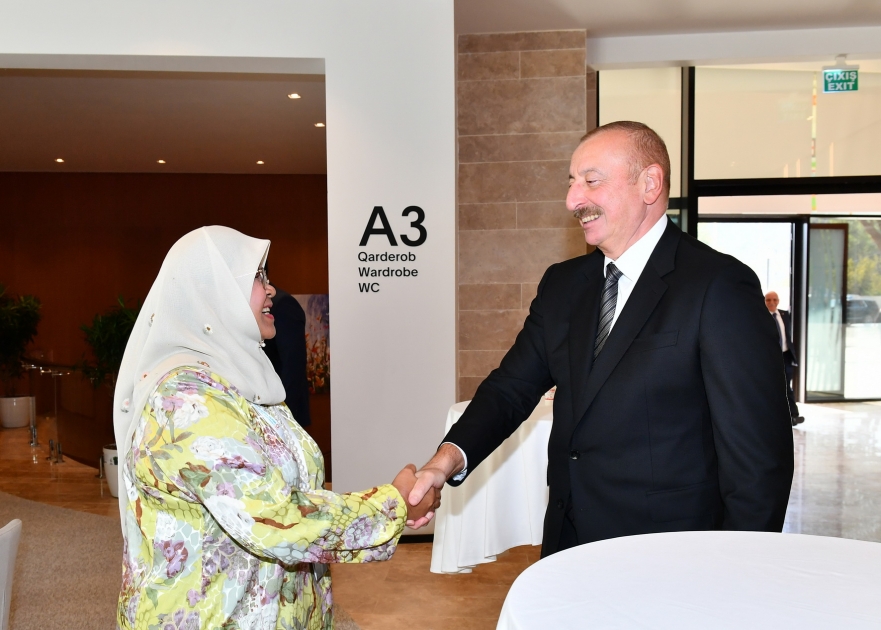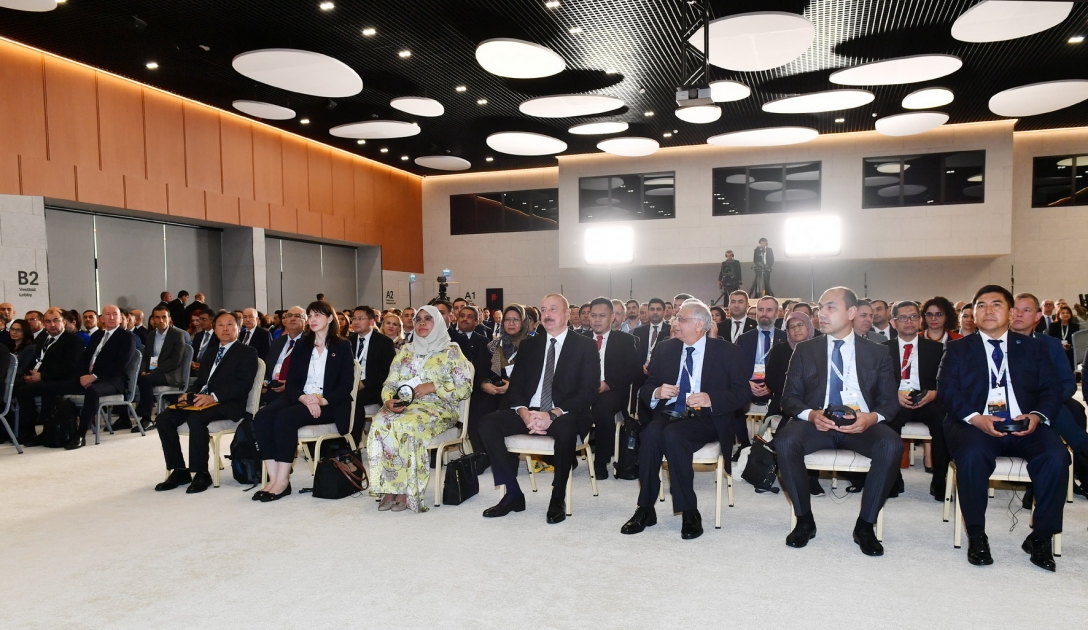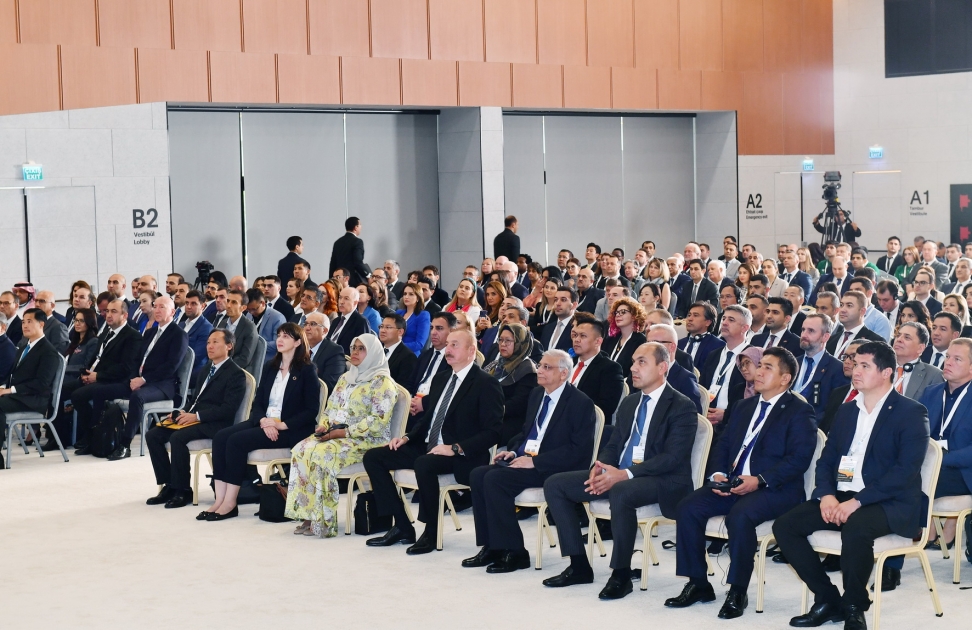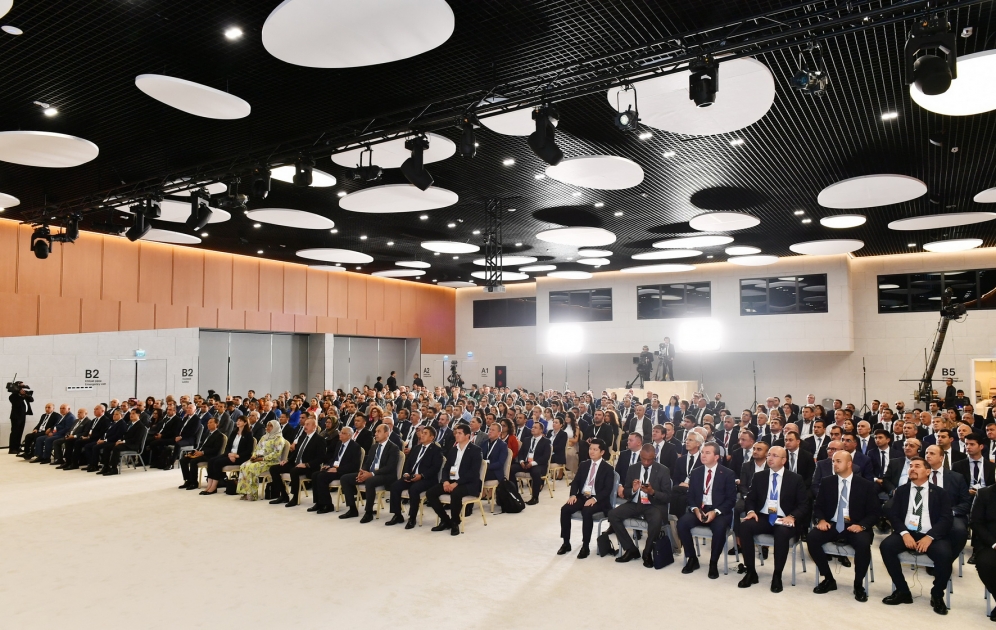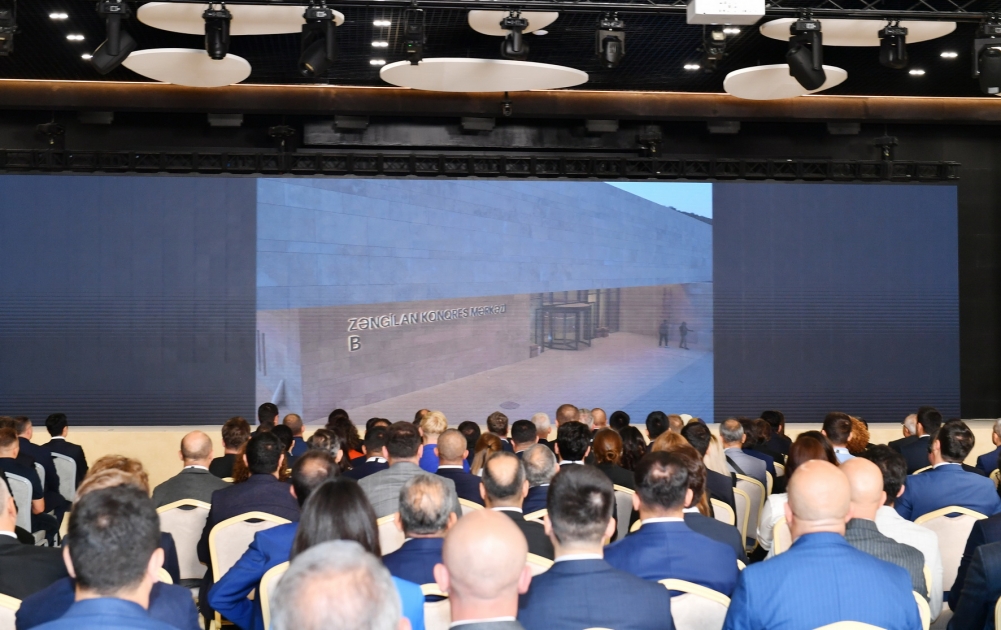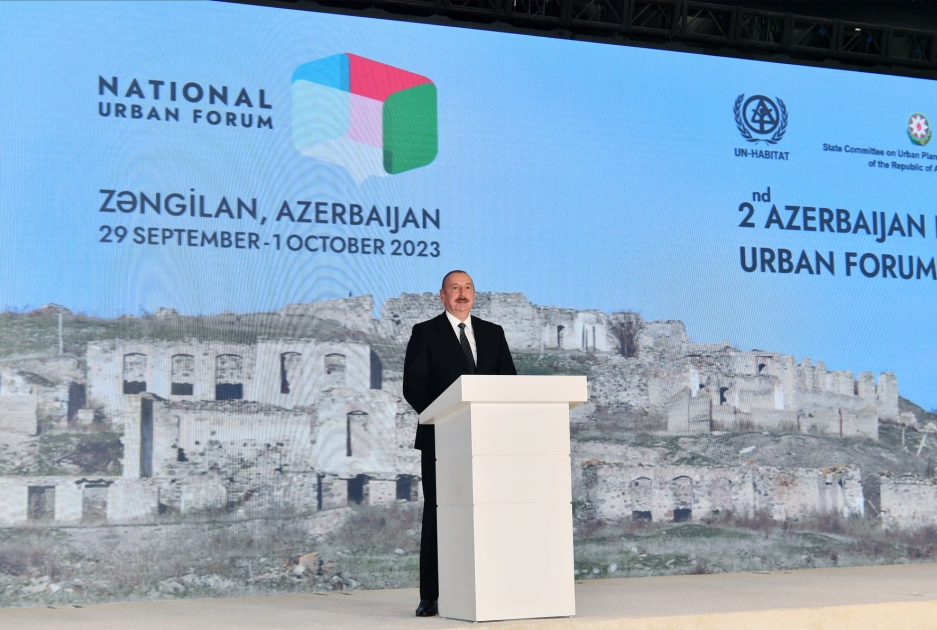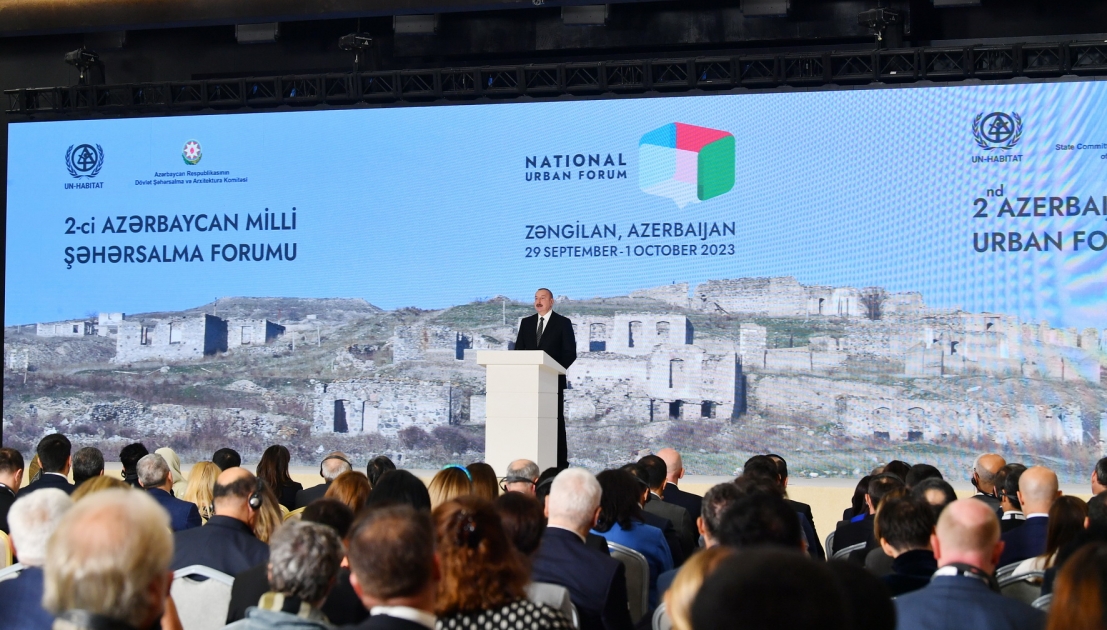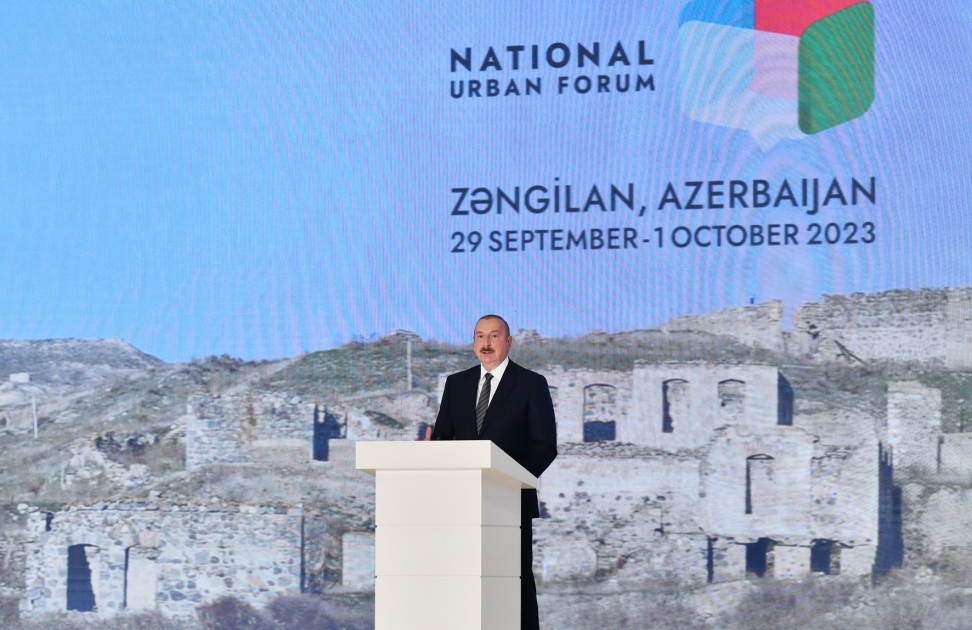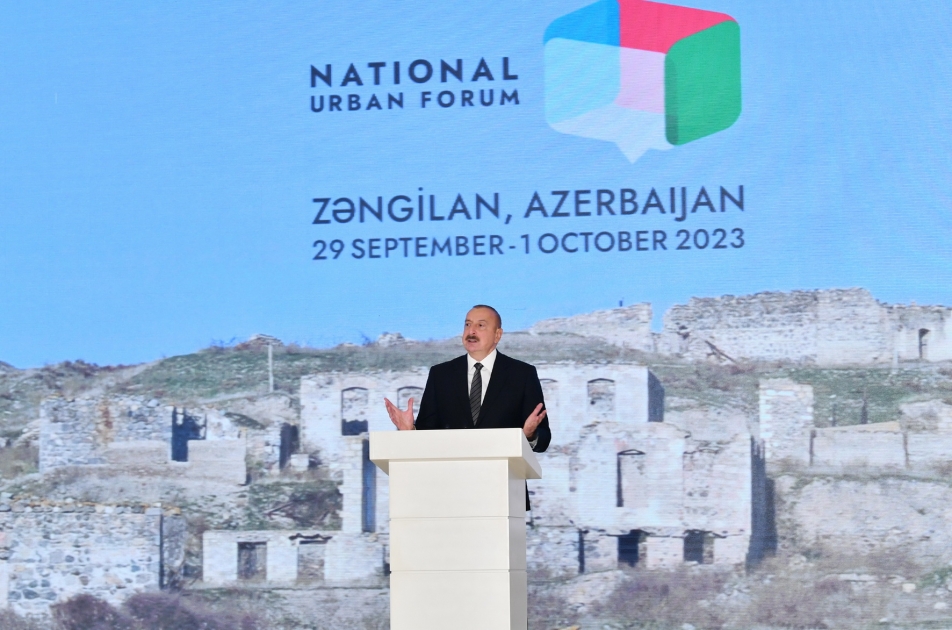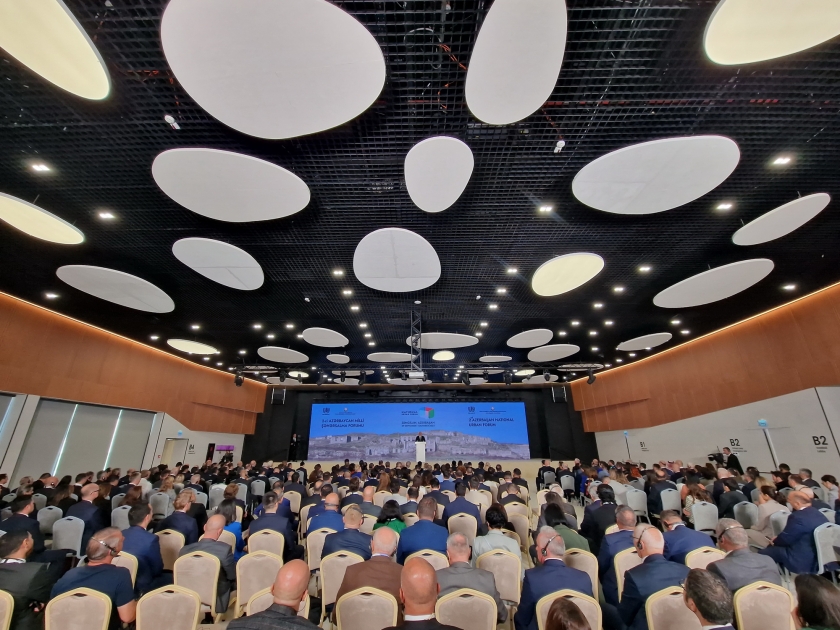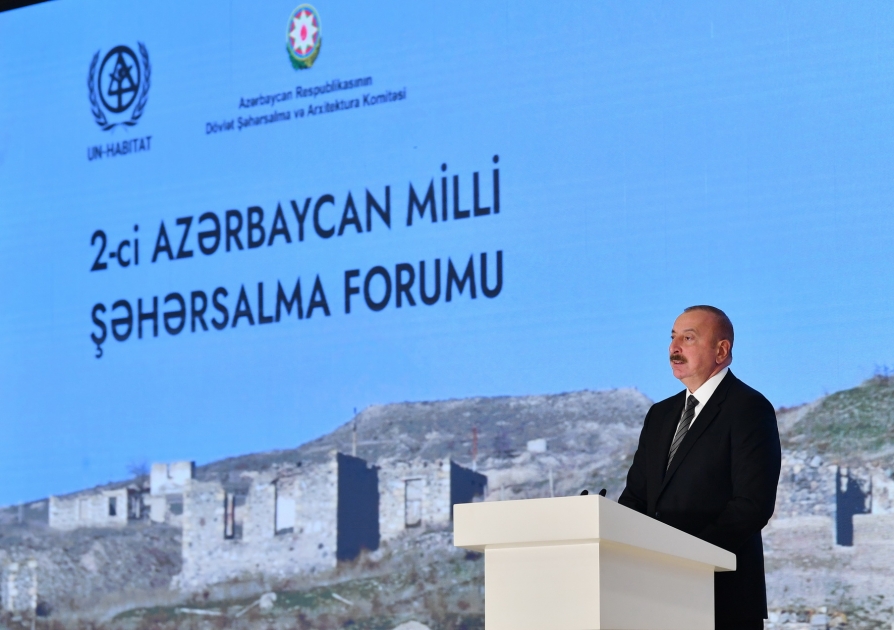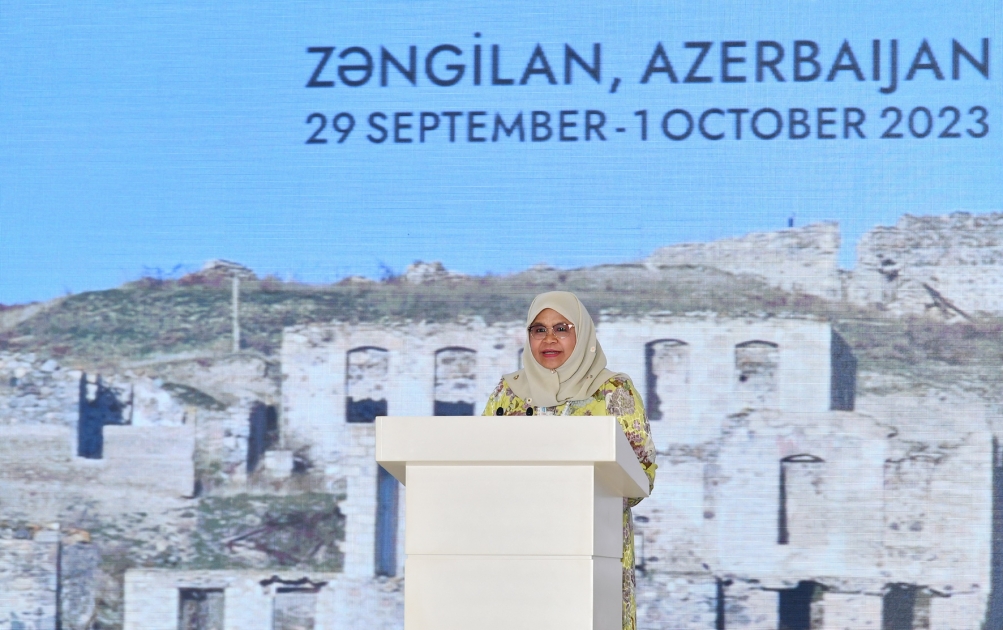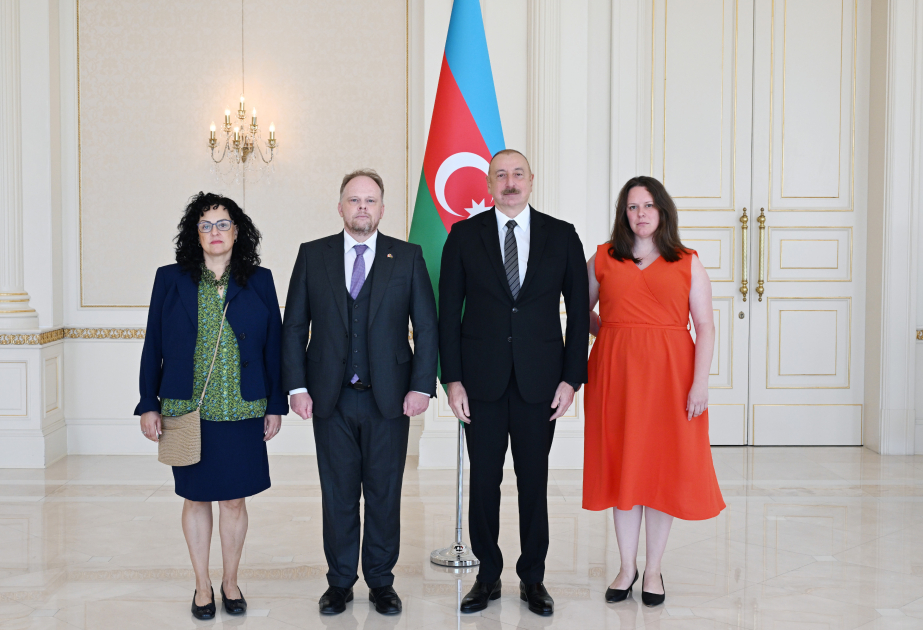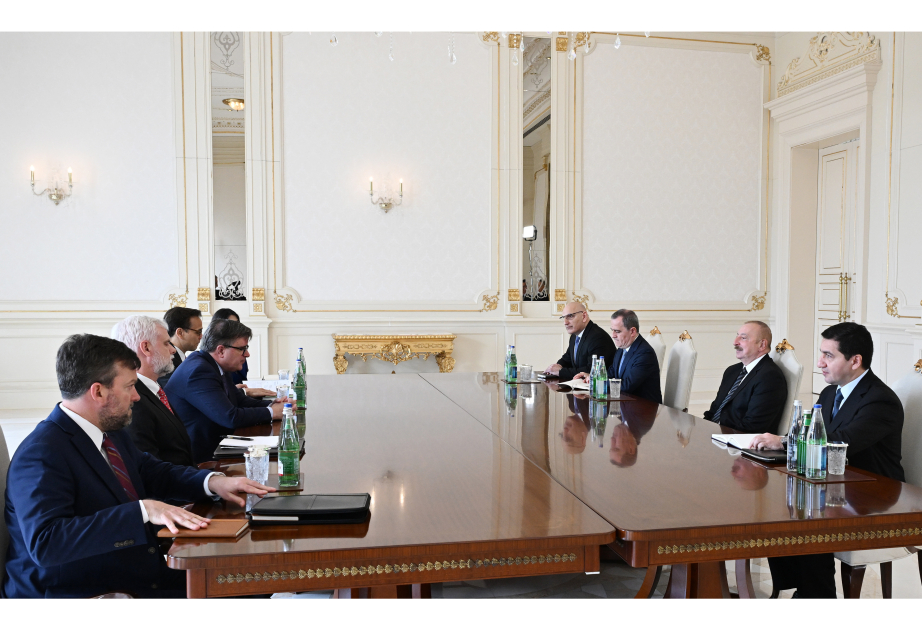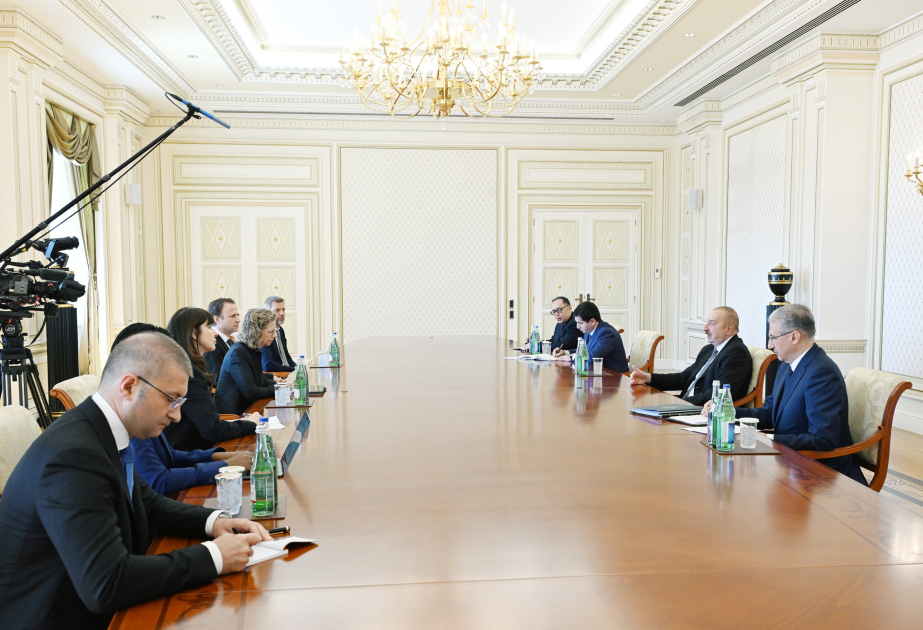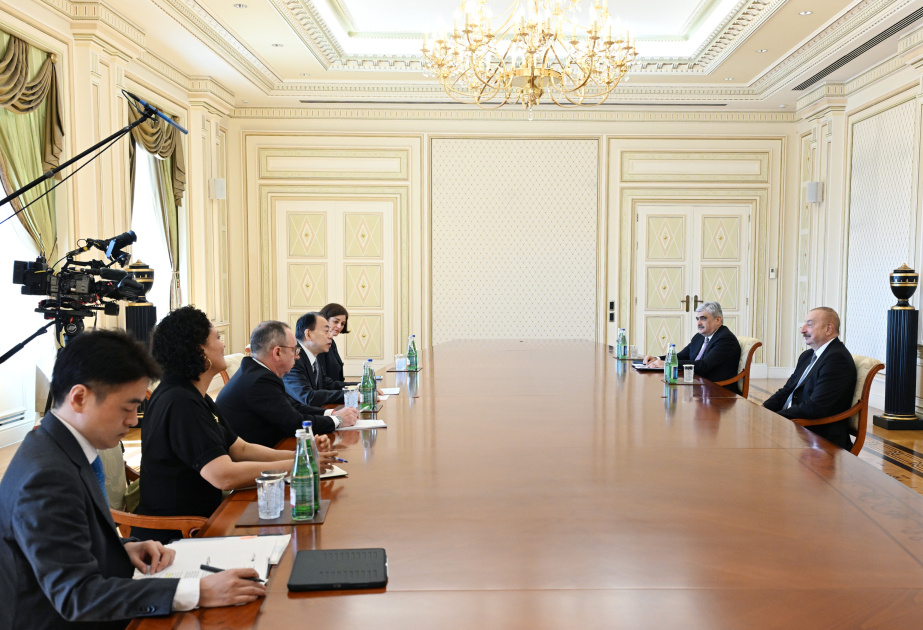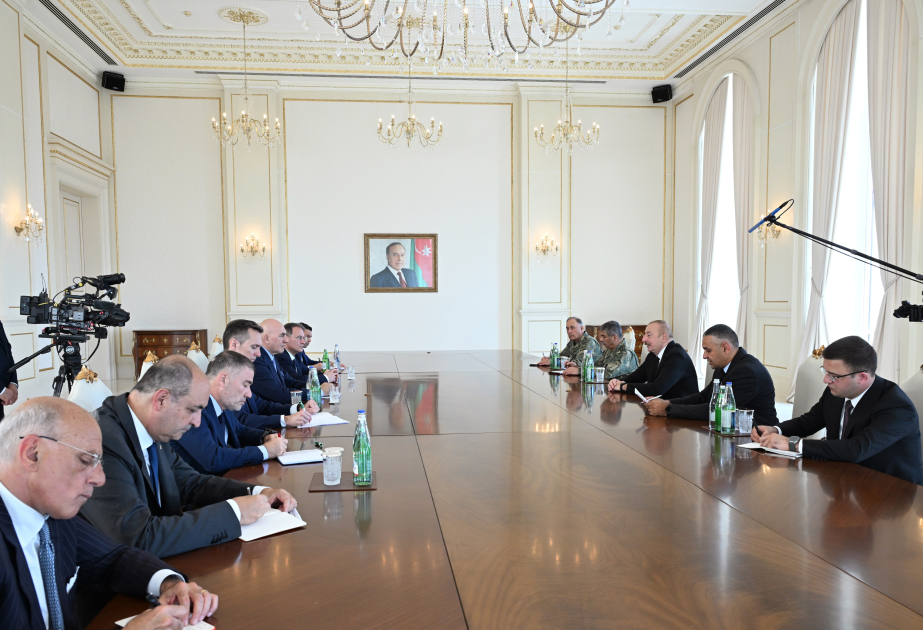OFFICIAL NEWS
The 2nd Azerbaijan National Urban Forum was held in Zangilan
President Ilham Aliyev addressed opening ceremony VIDEO
Zangilan, September 29, AZERTAC
The opening ceremony of the 2nd Azerbaijan National Urban Forum themed "Resilient cities as a driving force of economic development and fighting inequalities" organized by the State Committee on Urban Planning and Architecture of the Republic of Azerbaijan in collaboration with the United Nations Human Settlements Programme (UN-Habitat) was held in Zangilan as part of the Azerbaijan Urban Week.
President of the Republic of Azerbaijan Ilham Aliyev attended the opening ceremony.
The head of state addressed the event.
Address by President Ilham Aliyev
- Dear Executive Director of the UN-Habitat,
Dear guests, ladies and gentlemen.
Welcome to Zangilan! I welcome you here in the ancient region of Azerbaijan, eastern Zangazur, which is now being totally reconstructed along with Karabakh region of Azerbaijan.
I would like to express gratitude to all our guests. We have guests from 53 countries, almost 200 foreign guests and a total of 400 participants. This is the 2nd Azerbaijan National Urban Forum and a reflection of our friendship. This is reflection of our common interest to see totally destroyed areas during the occupation to be rebuilt.
I want to express special gratitude to Madame Executive Director for constant support to our initiatives and valuable recommendations with respect to urban planning. We build cities and villages from the scratch. Therefore, we need to apply modern technologies and create best possible conditions for former refugees who are already returning.
Last year, we held the 1st national Urban Forum in the city of Aghdam, also totally destroyed, and now there is also a big construction activity there.
Zangilan was the first region of the liberated territories, which already received the first former refugees. The smart village of Aghali, which was partially was shown on the video was inaugurated last spring. People, their families already live freely and happily. When I visited Aghali village many times before the return, and during the return, and after, I witnessed that people who return there are so deeply connected to their roots. The young generation who didn't ever see their homeland, because of 30 years of occupation, return. So this demonstrates that the people of Azerbaijan are deeply connected to their roots, and all the former refugees were waiting for the time when our land will be free and they will have a chance to come back. They were deprived of that chance by Armenia for 30 years. But three years ago, we put an end to the occupation.
Now, Zangilan hosts an international event. This newly built Convention Center was officially opened yesterday. And not only this, but in different parts of the Zangilan region, there is an active construction. As I already mentioned, the first smart village, Aghali, is situated in Zangilan region. We invest largely in the infrastructure. The city master plan has been approved. Several housing projects are already being implemented and hopefully in 2025, maybe even earlier, the first residents of Zangilan city will come back.
We consider Zangilan to be an important transportation destination because of its geographical location, and because it is situated on the transportation corridors. Therefore, Zangilan international airport construction was one of the important factors for development of the region and also for easy access of the people. In the future, I'm sure, there'll be a lot of foreign tourists here, because Zangilan is one of the most beautiful parts of Azerbaijan. It is all green - hills and mountains, rivers and lakes and a unique ecosystem of Zangilan. Really, it's a big treasure for us. So, I'm sure that as time passes, this will be one of the most attractive touristic destinations of Azerbaijan.
The Zangilan International Airport is the second one, which we constructed in the liberated territories. The third one in Lachin is being built, and within two years will also be inaugurated.
At the same time, we are restoring the railroad connection, which existed during the Soviet times. Because during the times of occupation, the railroad was dismantled by the Armenian occupational forces. So now, the railroad construction from Horadiz to Zangilan is in the active phase. This important part of the transportation corridor, which will connect Azerbaijan mainland with the Nakhchivan Autonomous Republic, and then with Iran and Turkey, and further down with Europe, will be completed very soon. Thus, Zangilan will be an important transportation destination. I would say the transportation center because of the airport, railroads. We are building now six and four-lane highway from Baku to Zangilan and actually, to all other destinations. More than a total of 2000 kilometer roads and highways are being built. So it's a large-scale construction, and every region of the liberated territories of Azerbaijan has a special master plan.
So we do not only have the pilot housing project in Zangilan but also the pilot agricultural project, a joint venture between Azerbaijani and Turkish companies, Dost Agro Park, dost means friend— which is already functioning. I think, Zangilan will also be a big contributor to the food security because 6 thousand Angus cattle have already been imported, and the total number will go up to 10 thousand. It must be taken into account that there are a lot of pastures in the area, especially in Lachin and Kalbajar districts, which always was a location for cattle farming. So this has really great potential.
And of course, employment. Because people who return to their homeland must be employed. We have a special program, which is part of a big return program for employment including self-employment, and also low-interest loans to farmers and of course, social infrastructure. In Zangilan, we already have a school. The big school in the city is being built. The construction of the Zangilan mosque is in the final stage. It is being built just next to the ancient mosque, which was destroyed by the Armenian occupational forces during the times of occupation, along with other 65 mosques out of 67, which existed. So, 65 have been totally destroyed and two partially destroyed. So that was another sign of urbicide and culturocide against Azerbaijan.
Now when the owners of these lands are back, we see rapid development. The big return program covers the reconstruction of all the liberated territories. Not just reconstruction but reconstruction based on modern technologies—smart city, smart village concept—with the most modern examples of urban development.
Since the Second Karabakh War ended, 7 billion US dollars have been spent up to now from the Azerbaijani budget for reconstruction of the liberated territories. For the next year, the minimum budget - which we plan, and soon it will be discussed in our parliament - is 2.4 billion US dollars. I can tell you that Azerbaijan implements all these projects at its own expense. We did not get any financial assistance, any support, apart from two brotherly countries, Uzbekistan and Kazakhstan. The presidents of these countries were very generous to donate - one of them a school and the other one an art center. Uzbekistan constructed a school in Fuzuli while the other one is close to completion.
So, this is a huge financial burden for Azerbaijan. But for us, the big return program implementation is the number one task.
People who suffered from the Armenian aggression lived in difficult conditions. They suffered the moral stress. They were deprived of the legitimate right to go back to their homeland, to visit the cemeteries. Most of the cemeteries, by the way, had also been destroyed by the Armenian occupational forces. They were waiting for 30 years for the time when they will be able to come back. The Second Karabakh War, which ended with a glorious victory of Azerbaijan, created this opportunity. They are waiting for us to bring them back as soon as possible.
The implementation of the Big Return Program already allowed starting the return of the former refugees to the cities of Lachin, Fuzuli, villages of Aghali, Talish and Zabukh. In total, the master plan of 8 cities and 92 villages has already been approved. Groundbreaking ceremonies for 30 villages have already been completed. In the coming years, there will be large-scale implementation of the housing projects, including in the city of Shusha and other cities. This is part of the program.
Another part, of course, is infrastructure. For instance, I was participating in the inauguration of the new hydropower plant here in Zangilan yesterday, which has a capacity of 10 megawatts, but within six months, 40 megawatts will be operational. So far, 90 megawatts of hydropower have been created in the liberated territories. Not to mention that we connected all the liberated territories with the electric system of Azerbaijan. So now, it is fully integrated. In total, the hydropower potential, which we will have in the liberated territories by the end of this year, will be 170 megawatts, and 270 megawatts by the end of 2024, which is really the substantial support to our green agenda. The area of the eastern Zangazur and Karabakh has the potential of 10 thousand megawatts of green energy - hydro, solar, and wind. This is, by the way, a small part of Azerbaijan’s potential, because the potential of the wind energy in the Azerbaijani sector of the Caspian Sea alone, is 157 gigawatts. So, Azerbaijan will soon transform into a country, which will be exporting green energy, including green energy. Potential here now has not only been evaluated - we already have an almost full map of potential - but there'll also be projects related to solar energy. A 240-megawatt solar energy power plant, hopefully, will start to be built next year in the neighboring district of Jabrayil.
So, energy potential, transportation, and of course, housing projects are all part of our agenda. We are absolutely sure that we will be able to meet our targets to resettle more than 100 thousand former refuges within the next three years. By the way, so far, 2300 former refugees have already been returned, and by the end of this year, their number will be 5500 thousand.
One thing I also want to bring to your attention is that refugees who suffered from the Armenian occupation for 30 years lived in different parts of Azerbaijan. The government tried to take care of them. Every year, we allocated a minimum of 300-500 million US dollars in order to implement new housing projects for them. About more than 300 thousand of them have been resettled in decent conditions in the new houses. Nevertheless, when our lands were liberated, we conducted a survey among them, and an absolute majority of them decided to come back. By the way, we have a kind of a queue of those who are waiting to come back. They are coming from Baku, from the second biggest city Sumgayit, from Ganja. They are coming from cities to villages. I think this also should be examined and evaluated. Now everybody talks about urbanization, including Azerbaijan. We have this problem for many years that people are coming from villages to big cities because there are more opportunities for jobs and for their life. But now, at the same time, we see the opposite. We see the flow from Baku, from Sumgayit, from Ganja, from Mingachevir, from cities to villages, and this, first of all, demonstrates how Azerbaijani people are committed to their homeland. They want to live on the land of their ancestors.
I think that today here in Zangilan, of course, and during the next days in Baku, when the forum will continue, discussions will be not only about sharing experience with urban planning and development, but also about future of the region and how we see the future of the region. I just want to bring it to your attention. We've been subjected to ethnic cleansing, occupation, and destruction of territories for 30 years. A million of Azerbaijanis were deprived of their homes, including more than 200 thousand from today's territory of Armenia. Our villages and cities have been destroyed. For three decades, the occupational forces did not allow us to come back, and they were actually blocking all the efforts of the international community to find a peaceful settlement to the conflict. Negotiations were held since 1992 until 2020. Can you imagine? 28 years of endless, and now as we see, useless negotiations, which produced zero result. If we look at the countries who were sponsoring these negotiations, we can easily see that if they wanted, the solution would have been found. Because three permanent members of the United Nations Security Council, three nuclear powers, were the co-chairs of the former Minsk group, which had a mandate to put an end to the occupation. That was kind of the OSCE branch, but at the same time, we had a legal basis. We had four UN Security Council resolutions, which demanded an immediate, unconditional and full withdrawal of the Armenian forces from the occupied territories. Those resolutions were adopted in 1993. But they were not implemented because of lack of political will. It is clear that Armenia did not want the resolution of the conflict. They wanted just to keep the status quo unchanged. They wanted to keep our lands under their control forever. They were conducting illegal settlements, by the way, including in Zangilan. Maybe in Zangilan, it was not so widespread, but in Lachin, in Kalbajar, in Shusha there have been thousands of illegal settlers who came from the Armenian diaspora from the Middle East and other countries.
Armenia was violating all the rules and norms of international law, committing crimes. According to the Geneva Conventions, illegal settlement is considered to be a crime. But the international community did not impose sanctions on them, did not even publicly accuse them, did not even call them straightforward to pull the troops back from our territory.
Therefore, the fact that the Second Karabakh War started is not only because of Armenia’s occupational policy but because of the ignorance of the countries, which had the mandate to facilitate negotiable peace and that peace was achievable. Azerbaijan was always very constructive on the negotiation table. We were waiting for 28 years for justice to be restored, but, then, we had to restore it ourselves for 44 days. We did it. The 44 Days War of 2020 was inevitable - first, because of the reasons, which I already mentioned; second, because Armenia wanted to freeze the situation forever, thinking that new generations of Azerbaijanis will not think about Karabakh. But they were wrong. Today, in the schools of Aghali, Fuzuli, Lachin and Zabukh, Talish, we have hundreds of children of the families of former refugee, who have never seen those places but they are there. Because in the memory of the Azerbaijani people, no one can wipe out the memory of our lands and our history. So that was clear that Armenia wanted to keep the situation under their control as they thought with no war, no peace, endless negotiations without any result. And at the same time, the hopes with respect to the new Armenian government during the last several years also vanished.
With respect to the previous governments, it was more or less clear. For 20 years, Armenia was run by a criminal regime of war criminals who committed themselves—two presidents of Armenia —themselves participated in the Khojaly genocide and must be brought to justice for that. They participated in looting and devastating our lands. For 20 years actually, they were trying to use this tactic in our occupied territories, and used this tactics in Armenia too.
They now face the hatred of the Armenian people also. The hopes with the current Armenian government, unfortunately, were also exaggerated, because if the current Armenian government wanted to find peace with Azerbaijan, it was reachable and Azerbaijan was ready. The international mediators knew it. The former Minsk group co-chairs know it very well that we were ready to find a peaceful solution based on the restoration of our territorial integrity and the protection of the rights and security of the Armenian minority. And we are ready for that now, and after we won the war and after the military operation, which took place 10 days ago, now we officially declare that the rights and security of the Armenian population of Karabakh will be protected. We already presented to the Armenian community of Karabakh our vision for reintegration, which covers their rights —religious, educational, cultural, municipal, all the rights, which are reflected in international conventions, which Azerbaijan signed in line with our Constitution and in line with our international commitments.
But coming back to the situation before the Second Karabakh war, I think that the Armenian government missed the chance. They underestimated us, overestimated themselves, overestimated their plans to use external military support against us, but they miscalculated the situation. And it was clear that Azerbaijan was fighting on its own territory. It was our legitimate right, by the way, provided by the UN Charter, the right for self-defense, which Azerbaijan used three years ago and Armenia had to capitulate. But what happened after? After that, almost immediately, we again initiated the beginning of peace negotiations. For a country and for the people who suffered from war, from hatred, from genocide, that was a really strong political move to offer peace. We then offered to create commissions, Armenia-Azerbaijan commissions on the delimitation of borders. But Armenia did not positively respond. By the way, peace negotiations did not lead to any progress. Though, within three years, that could have been done. Again miscalculation, again reliance on foreign supporters, lead them to another difficult situation.
If we look at the rhetoric of Armenian governmental officials, including high-ranking official, who now try to accuse us of what we have never done - their rhetoric was very clear. In 2019, the current leader of Armenia announced in Khankendi that Karabakh is Armenia, finish, and that was the end of the negotiation process. So that was a red line, which shouldn't have been crossed. No one before expressed that wording. That was actually the end of ceasefire, because there was no use in having any negotiations when the Armenian leader openly declares that the internationally recognized part of Azerbaijan belongs to Armenia. What kinds of negotiations can be held?
Nevertheless, we thought that probably that was a kind of political mistake. We still had hopes. Then, there was even more. The Defense Minister of Armenia announced that Armenia is ready for a new war with us for new territories. So, they were intimidating us with new occupation. 20% of the occupied territories of Azerbaijan probably was not enough for them. They wanted more. Their plans was to come to Baku, and swim in the Caspian Sea. Their plans was to come to Baku with tanks. But Armenian tanks really are in Baku, but they are in the park of military trophies. So a lot of miscalculations, a lot of underestimations of Azerbaijan, its will, its potential, its power led to a serious disaster for the region.
Still, there was a chance to normalize relations with Armenia after the Second Karabakh war, but they had to put down all their territorial claims and stop articulating contradictory statements. On one hand, the Armenian leader recognized the Azerbaijan's territorial integrity, and on the other hand, on the second of September, he sent a letter of congratulations to the leader of the fictitious regime with respect to its independence. So how can that match? That meant again the territorial claim against us after three years of a miserable defeat of the Armenian army, when, according to their information, they had more than 12,000 deserters, and they ran away from our territories like sprinters.
So that was another crossing of the red line. On the ninth of September—I don't know how many red lines can be—the so-called “parliament” of the so-called “Nagorno-Karabakh regime” elected the so-called “president by 22 persons. What this person said in his so-called inaugural speech? That they will fight for the status. What did that mean? How should we have reacted?! Could we tolerate that? Of course not. So all what happened 10 days ago is because of irresponsible policy of the Armenian Prime Minister and separatists in Nagorno-Karabakh sponsored by him.
The anti-terror operation lasted less than 24 hours. Now everybody knows how it ended. Did we continue? No, we stopped. We did not have any intentions to continue. If we wanted to continue, it's not difficult to predict where we could have stopped, if we decided to stop at all. But we didn't. That's not our intention. We recognize the Armenia’s territorial integrity, and declare that and we mean it. Because if we had other intentions, on the 20th of September, things wouldn't have stopped. I want everybody to know it. The Armenian leadership, those who stand behind them, and those who may think about some unacceptable plans against Azerbaijan - my advice is not to test our patience once again. We are patient, but we're firm, and we can prove that we are right. Not because we have power, but because the truth is on our side.
After what happened on the 20th of September, it's time really to sit together by teams from Azerbaijan and Armenia, and to work on the draft peace agreement. I think, after Azerbaijan restored its sovereignty on the 20th of September, it will be easier to find the solution, sign a peace agreement as soon as possible, and after that or in parallel with that, to actively work on the delimitation of border and put an end to a long-lasting confrontation. We want peace in Azerbaijan. I think what we see here in Zangilan demonstrates that we want peace. We want to rebuild the country, bring our former refugees here, and live peacefully. We want peace in the Caucasus. It is reachable and the choices should be made by Armenia.
On the 8th of November 2020, when our Army liberated Shusha. Actually, that victory was the symbol of our will. Two days after, Armenia capitulated and Azerbaijan put an end to the occupation. On the 23rd of April this year, when we established the border checkpoint on our border with Armenia in Lachin district, we totally restored our territorial integrity because we started to control completely all our borders. On the 20th of September, this year, we restored totally our sovereignty. So no more gray zones, no more illegal structures, no more separatism on our land. This demonstration of strong political will, unity of the people of Azerbaijan, and also the readiness of the Azerbaijani government for peace with Armenia, is a good signal to all those who still think about revenge and live with revanchist ideas. They need to put that down.
On the 20th of September, we said to separatists, to the Armenian Army in Karabakh, to put down weapons, disarm, and leave. And it happened. So, we keep our word. I'm sure that if the Armenian government analyzes properly the events since that trigger statement “Karabakh is Armenia,” articulated by the Armenian Prime Minister in 2019, until the 20th of September, if the analysis is proper, I think, the peace is not far away. That's how we see the future of the South Caucasus, the future of the broader region. And from our side, I think, our neighbors and international actors only will see a constructive approach.
So once again, dear guests, dear friends, welcome to Eastern Zangazur, to Zangilan. I wish the forum success. Thank you.
XXX
Then, Executive Director of the United Nations Human Settlements Programme (UN-Habıtat) Mrs. Maimunah Mohd Sharif delivered her speech.
XXX
Following the opening ceremony of the forum, the event continued with sessions on various topics. First, a special session on "Rebuilding together - collaborative approaches for regional resilience and sustainable development" was organized.
The first session on "Resilience and sustainable development: strategies, actions and international collaboration opportunities" featured discussions on rebuilding lives - rehabilitation strategies for the liberated areas, enhancing regional development for sustainable connectivity and economic revival of the region, role of international collaboration for post-conflict recovery.
The second session entitled “From desolation to resilience: the path to a better future” featured discussions on fighting the hidden threat - mine contamination and its impacts on sustainable development, as well as resurgence of regional centres, cooperation opportunities in Karabakh and Master plan of Zangilan city - the way forward.
The participants of the event also visited Aghali “smart village” and familiarized themselves with the speedy reconstruction projects being carried out in Zangilan.
The 2nd Azerbaijan National Urban Forum’s next sessions will be held in the capital Baku and wrapped up on October 1.
On October 2, the capital Baku will host the World Habitat Day for the first time, which will bring together influential international experts and government officials.
